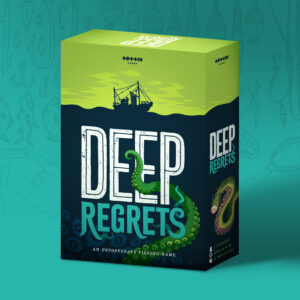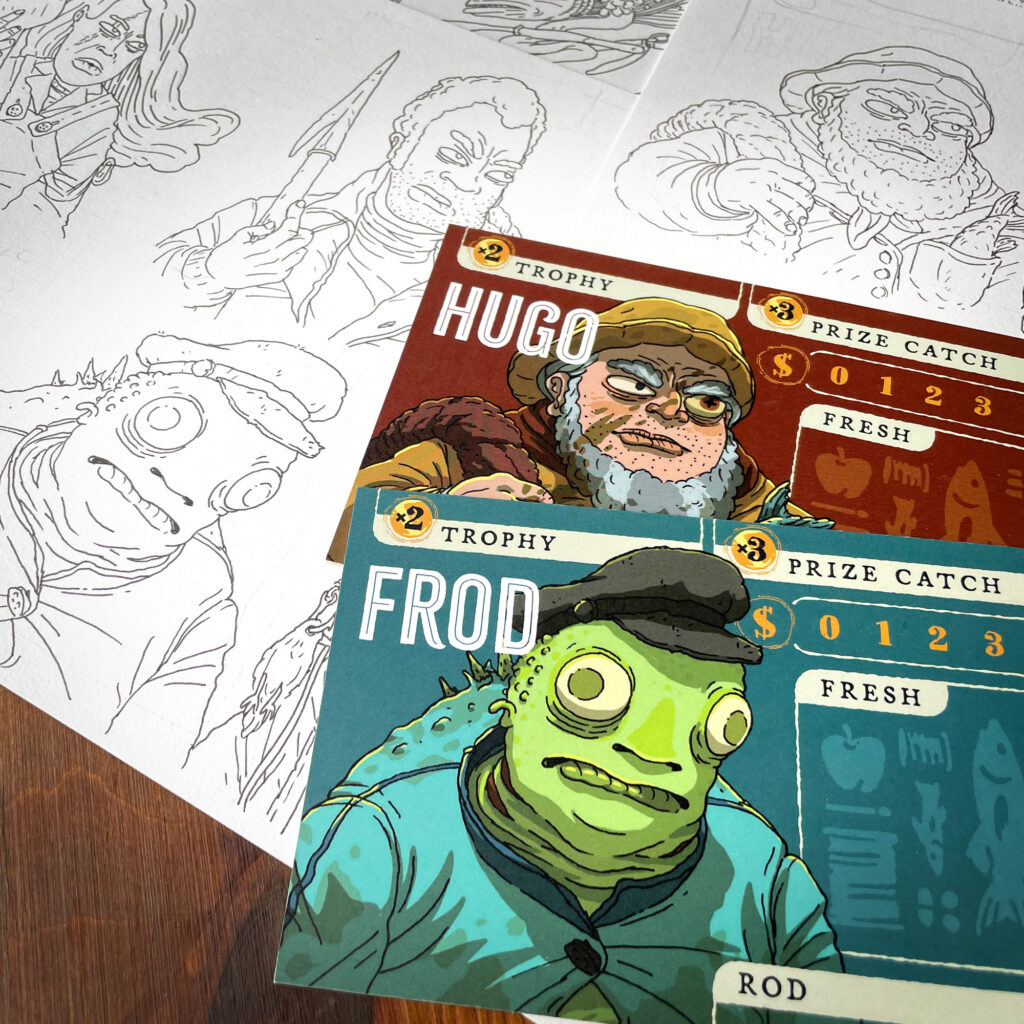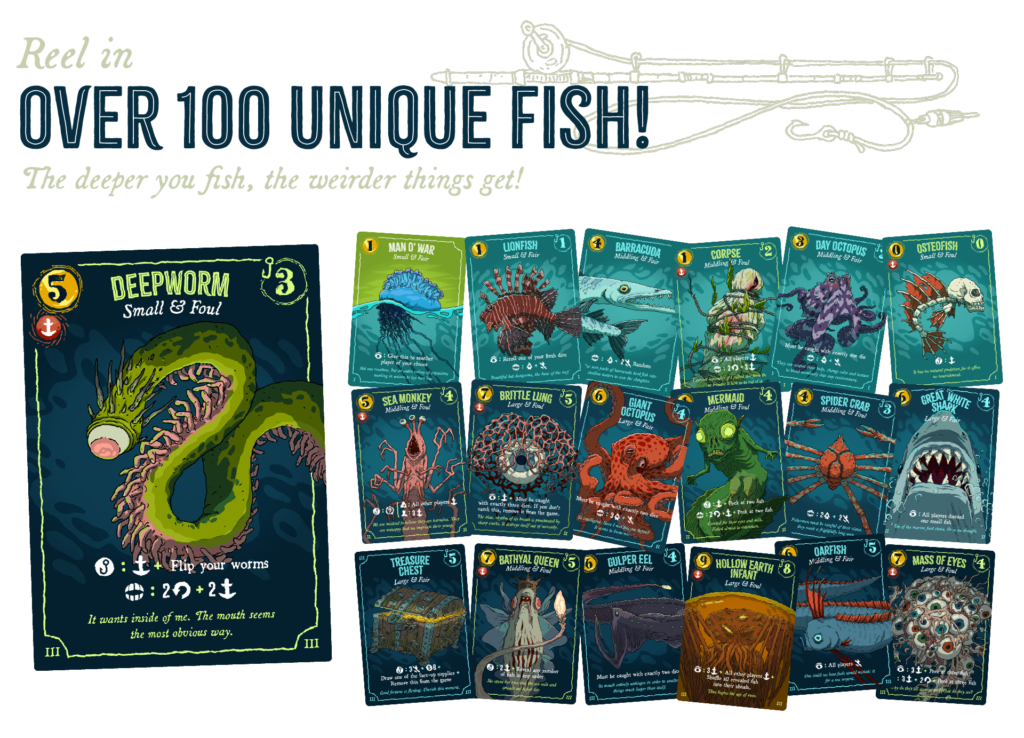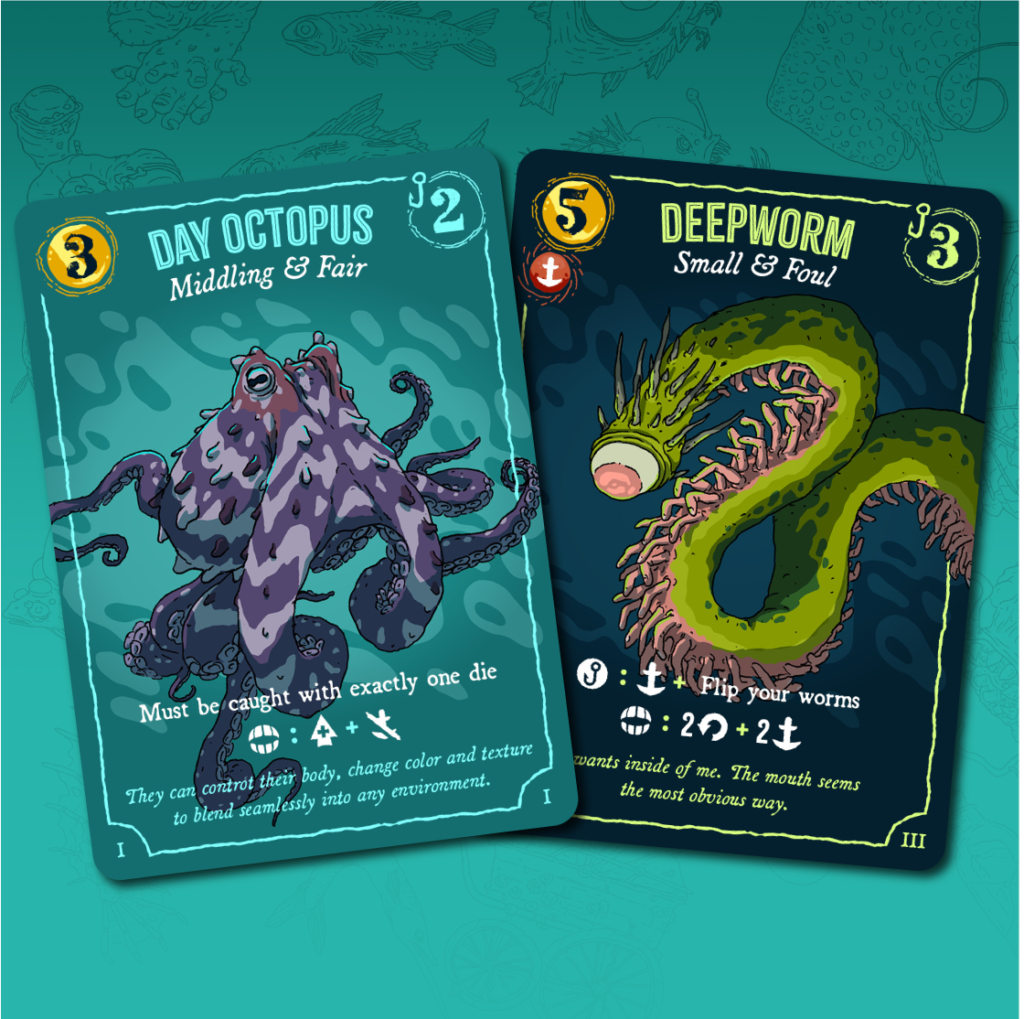Thalassophobia – the fear of the ocean – is a very real thing. After all, once you start really getting down there, the vastness of the open water is just about as terrifying to think about as some might consider outer space. And it’s certainly just as alien.
The major difference is that there are actually some other-worldly creatures down there!
Now what if I told you that you could experience a blend of nautical eldritch madness along with the coziness of fishing in the deep blue sea, as a board game?
Board game designer Judson Cowan of Tettix Games joins us at Nerds on Earth HQ this week to talk about his upcoming board game, Deep Regrets, touted as “An Unfortunate Fishing Game”!
Talking about Board Games: An Interview with Judson Cowan
Abram: Judson! Thanks so much for taking the time to answer some questions about your upcoming board game, Deep Regrets! I’ve been following along with your progress in your Deep Regrets Facebook Group, and it’s been really fascinating to see this game evolve over time. For some reason I keep thinking this is your first board game design, but that can’t be the case; can you tell me about how Deep Regrets came to be?
Judson: Deep Regrets came into existence about a year ago. I’ve always been a huge fan of sea horror and I feel like the genre is woefully under-represented in not just board games, but all mediums. I’m doing my part to fix that! I love spooky stuff and I love games with massive variety where you’re always turning over a card you haven’t seen before – thinking Wingspan specifically here – so I set about combining those concepts into a game that captures the alluring but stressful adventure of delving mysterious ocean fathoms.
And believe it or not, It’s actually my third game! I’ve published two editions of Hideous Abomination, a more family-oriented monster-building game. And the first game I started developing is actually Fright House, a massive strategy game about building haunted houses and sending guests through to try to scare them without accidentally killing them. That one may never be completed, however, it’s an ungainly beast.
Abram: I’ll have to check out Hideous Abomination! I’ve been playing a ton of Dredge lately, which has a lot of similarities with your game in the sense that it emphasizes a blend of eldritch horror, the fathomless deep, and fishing. Are these all interests of yours, or what sources of inspiration did you draw from for the creation of Deep Regrets?
Judson: Dredge was a massive inspiration to me. I think what Black Salt Games made there is something really special and so specifically targeted at me, a big Lovecraft fan with a fascination with the unknowable deep. I had originally been designing a game about the tides washing things up on the beach that you would collect before they were washed back out to sea. But then I recently read Jonathan Langan’s The Fisherman and watched Robert Eggers’ The Lighthouse and played Dredge and the 2018 Call of Cthulhu game and the combination of all those things in sequence made me change the concept to be about fishing.
And this may sound ridiculous, but another huge inspiration here was Scooby Doo. Specifically the episodes that involve the Sea Demon or the glowing diver-suit of Captain Cutler. In general, Scooby Doo and/or Haunted Mansion is kind of my personal aesthetic: cartoonishly spooky. The mood I wanted to capture with Deep Regrets was if the gang had to investigate a wave of eldritch horrors and wound up drinking themselves to death in remorse.
Other big inspirations for me: Shadow over Innsmouth (obviously), Annihilation (and the rest of the Southern Reach trilogy), Hellboy and BPRD, Junji Ito, The Sinking City, The Shore, the list goes on.
Abram: Shadows over Innsmouth was a big inspiration for my first DnD 5E homebrew adventure, so it always has a soft spot for me. One of the first things that really grabbed me was your artwork, which you’ve completely hand-drawn on your own – an astonishing feat in its own right. Your style is also really unique, kind of like a mix of Genndy Tartakovsky’s Primal, but with a hint of Matt Groening? Do you attribute your illustrative style to any particular artists?
Judson: Thanks! I love drawing monsters and I love that making board games gives me excuses to draw lots of monsters. Primal was not really an inspiration to me, but it’s an incredible series and very beautiful so I take that as a huge compliment! Matt Groening, on the other hand, absolutely an influence. I love big googly eyes and that definitely comes from a lifetime of watching Simpsons and Futurama. Zoidberg definitely has his claws in Deep Regrets.
I’m a big fan of colorful monoline artwork so I love artists like Moebius and Geoff Darrow. Big fan of Guy Davis, especially the monsters he did for BPRD. Obviously Mike Mignola is also a huge inspiration and I think you can probably see a bit of his Bog Roosh and Abe Sapien in some of my fish designs.
Abram: Definitely can see their inspiration in your work! I’ve had the pleasure of playtesting Deep Regrets in your Tabletopia implementation, and the gameplay feels really polished. How does the current version of Deep Regrets differ from the initial version that you prototyped? Were there any major changes that you made that weren’t even inklings of a thought during that first draft?
Judson: Oh yeah, totally. The game has undergone some massive changes since inception. The core gameplay hook of deciding which of nine piles of fish at three depths to fish from has always been present, as has the loop of moving from sea to port and back. But everything else has been in flux. One of the most significant changes from early prototyping was how the Regrets/Madness system works. It used to be universal where there was a madness meter for the world at large and things players did could affect it, causing repercussions for everyone.
There are things I miss about that system, namely the “take that” mechanics of changing the value of fish for other players unexpectedly. But ultimately, having players manage their own Regrets and Madness made for a more interesting and balanced game.
A lot of the feedback I got early in development was that Regrets cards didn’t feel significant enough. In early versions of the game, the only thing they affected was end-of-game scoring and there was no benefit to having them at all. The way I changed the rules so that the number of Regrets you’ve accumulated is what dictates your madness level and thus the value of fish and how many dice you can use at once created a much more dynamic push-your-luck mechanic that feels far more in keeping with the theming of the game.
The whole thing now revolves around Regrets, they’re core to the gameplay. I like this concept of people going slowly more crazy and being willing to work longer hours and becoming covetous of more and more weird fish.
Abram: That feeling of just staying out for one more fish is a really big temptation. Table presence is obviously a really huge part of board game design; when players are walking by the innumerable tables at conventions, I’m always inclined to stop by tables where the game demands attention, and Deep Regrets definitely fits the bill there. You have unique components all over the place between the fishing bobber dice and the little life preserver. I can tell there’s intentionality in your design. How much of the gameplay, or what aspects of the gameplay, drove some of those decisions for your components?
Judson: Theming is paramount for me and I feel like every design decision should be guided by the mood you’re trying to achieve. The design of the dice, which are intended to look like old wooden buoys, was to give a tactile quality to the game. The visuals are easy to align, but I like the idea of the things you touch also adding to the immersion.
The life preserver specifically was born out of a nice combination of theming and practicality. The player who rolls the best at the start of the round gets to give the life preserver to another player of their choice, so ultimately the one they feel is doing worst. Thus a life preserver makes thematic sense – you throw it to the player most in need of help. That player can use the life preserver to either reduce the difficulty of a fish or reduce the cost of an item.
The catch was that players tended to forget they had the life preserver so my aim with the design of the component was to keep it fresh in mind. Part of that it making it a vibrant color and part of that is literally just making it a thing that’s fun to toy with. Being a ring, people tend to pick it up and spin it around their finger, keeping it top of mind. It works remarkably well as a solution!
Abram: One mechanical choice that’s really hot right now in the world of board gaming is asymmetry. Everybody is trying to be the next Leder Games in terms of offering unique abilities and different victory conditions. Deep Regrets keeps everyone in the same boat (hehe). Was asymmetry ever an option for the game or can you walk us through how different aspects of the game offer meaningful choices to the players that kind of shape their strategy?
Judson: As a designer, asymmetry terrifies me. I play games like Disney’s Villainous and just marvel at how they balanced something so completely asymmetrical so well. I think that the type of games I like to design are somewhat at odds with the concept of asymmetry. I like games with a massive variety and a lot of randomization so that you never know what’s going to happen.
In games like this, it’s important that all players have equal opportunities to choose how they interact with the game and asymmetry could lead to one player having a strong advantage over another based on what cards come up that game, etc. Coming back to games like Wingspan or Everdell – both of which have massive variety – there’s no asymmetry because the designers wanted to ensure all players had equal agency in a chaotic environment.
That’s what I’m going for here: maximum player agency against chaos. The customization comes from the decisions the players make. Which fish they decide to sell, what gear they decide to buy, how they decide to spend their turns and when they decide to return to port. I want there to be a few viable strategies that are heavily influenced by meta game. One player might opt to stick to catching fair (normal) fish at shallow depths and avoid collecting regrets, aiming to get a lot of low-scoring fish and win with volume.
Another player my choose to throw caution to the wind and try to fish up as many foul (weird) fish as possible, ignoring their regrets and accepting that they’ll lose some of their fish at game’s end. And other players need to react to the decisions of their competitors, deciding how many regrets they feel comfortable carrying, if they feel confident using their lifeboat, and how they want to mount their fish based on measured risks. It can get a bit nail-biting near the end!
Abram: When we played there was always a feeling of wanting to do all the things, which is a great ‘problem’ to have. I really appreciate your time giving us a glimpse underneath the surface at Deep Regrets, Judson! One parting question because the inquiring masses need to know: what is your favorite fish in the game and why??
Judson: I have to pick just one?? How about I do one each for fair and foul? My favorite fair fish is the Day Octopus – I just love the color scheme and I’m obsessed with octopuses so this guy is very appealing to me. And for foul, I’m going to go with the Deepworm – it’s literally the first fish I came up with (though the original artwork was much different) and I just love the color scheme and simplicity of it. And all those little human fingers.
One of the biggest problems I had designing the game was making fish that were more disturbing than what already exists in the oceans. It’s messed up down there. Ultimately what I wound up doing was utilizing the uncanny valley and making the weird fish more human. That worked a treat.
Abram: This has been a delight talking to you Judson; thanks so much for the insight into Deep Regrets, and best of luck on the upcoming Kickstarter!
Judson: Thanks for having me! It’s been a pleasure!






